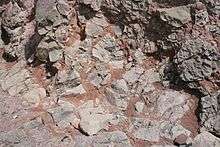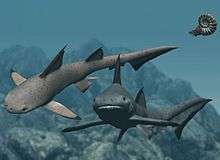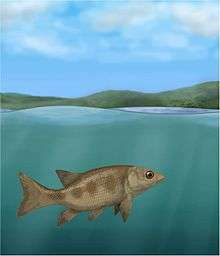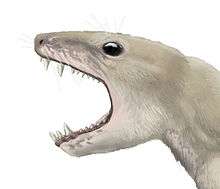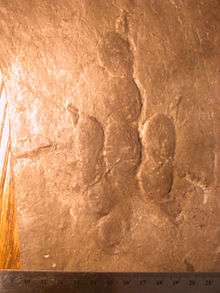McCoy Brook Formation
The McCoy Brook Formation is a geological formation dating to roughly between 200 to 190 million years ago and covering the Hettangian to Sinemurian stages. The McCoy Brook Formation is found in outcrops around the Bay of Fundy, Nova Scotia.
Age
The McCoy Brook Formation rests on the North Mountain Basalt, one of the volcanic flows associated with the Triassic–Jurassic boundary in the Newark Supergroup. The base of the McCoy Brook Formation is probably within 100,000 to 200,000 years of the boundary.[1]
Scots Bay Member
This thin unit (9 m) of lacustrine sediments is preserved in six small synclinal outcrops around Scots Bay on the west side of the Blomidon Peninsula. Originally named as the Scots Bay Formation, it is now correlated with the lowermost part of the McCoy Brook Formation, where it is referred to as the Scots Bay Member.[2][3]
Fauna
Sharks
|
|
|
Color key
|
|
Notes
Uncertain or tentative taxa are in small text; crossed out taxa are discredited. |
Ray-finned fish
|
|
|
Color key
|
|
Notes
Uncertain or tentative taxa are in small text; crossed out taxa are discredited. |
| Ray-finned fish of the McCoy Brook Formation |
| Name |
Species |
Location |
Stratigraphic position |
Material |
Notes |
Images |
| ?Redfieldiid[1] |
None designated[1] |
|
|
Scales and skull bones[1] |
Found in lacustrine limestone and lacustrine basalt aggregate[1] |
|
| aff. Semionotus sp.[1] |
None designated[1] |
|
|
|
Found in lacustrine limestone, lacustrine basalt aggregate, and lacustrine mudstone[1] |
|
|
Synapsids
|
|
|
Color key
|
|
Notes
Uncertain or tentative taxa are in small text; crossed out taxa are discredited. |
Sphenodonts
|
|
|
Color key
|
|
Notes
Uncertain or tentative taxa are in small text; crossed out taxa are discredited. |
| Sphenodonts of the McCoy Brook Formation |
| Name |
Species |
Location |
Stratigraphic position |
Material |
Notes |
|
Clevosaurus[4] |
C. bairdi[4] |
Wasson Bluff[4] |
Lower McCoy Brook Formation[4] |
Partial skulls and jaws, isolated cranial bones, partial postcranium, postcranial bones[4] |
A sphenodontian of relatively small size,[4] found in fluvio-lacustrine sandstone and mudstone, and basalt agglomerate[1] |
|
|
|
|
Color key
|
|
Notes
Uncertain or tentative taxa are in small text; crossed out taxa are discredited. |
| Protosuchidae of the McCoy Brook Formation |
| Genus |
Species |
Location |
Stratigraphic position |
Material |
Notes |
Images |
| Protosuchus[5] |
P. micmac[5] |
Wasson Bluff[5] |
Lower McCoy Brook Formation[5] |
Partial lower jaw, several other skull bones[5] |
Found in fluvio-lacustrine sandstone and mudstone, and basalt agglomerate[1] |
|
| Sphenosuchid[1] |
indeterminate[1] |
|
|
A maxilla[1] |
Found in fluvio-lacustrine sandstone and mudstone, and basalt agglomerate[1] |
|
|
Dinosaurs
Ornithischia
|
|
|
Color key
|
|
Notes
Uncertain or tentative taxa are in small text; crossed out taxa are discredited. |
| Ornithischians of the McCoy Brook Formation |
| Genus |
Species |
Location |
Stratigraphic position |
Material |
Notes |
| "Fabrosaurid"[1] |
Indeterminate[1] |
|
|
Teeth[1] |
Found in fluvio-lacustrine sandstone and mudstone, and basalt agglomerate[1] |
|
Sauropodomorpha
|
|
|
Color key
|
|
Notes
Uncertain or tentative taxa are in small text; crossed out taxa are discredited. |
| Sauropodomorph dinosaurs of the McCoy Brook Formation |
| Genus |
Species |
Location |
Stratigraphic position |
Material |
Notes |
Images |
| Fendusaurus[6] |
F. eldoni[6] |
|
|
Several partial skeletons[1] |
Although long assigned to Ammosaurus, the material actually represents a new genus and species;[6] found in fluvio-lacustrine sandstone and mudstone, and basalt agglomerate[1] |
|
|
Ichnotaxa
|
|
|
Color key
|
|
Notes
Uncertain or tentative taxa are in small text; crossed out taxa are discredited. |
| Ichnotaxa of the McCoy Brook Formation |
| Genus |
Species |
Location |
Stratigraphic position |
Material |
Notes |
Images |
| Anomoepus[1] |
A. scambus[1] |
|
|
Footprints |
Found in fluvio-lacustrine sandstone and mudstone[1] |
|
| Batrachopus sp.[1] |
None designated[1] |
|
|
Footprints |
Found in fluvio-lacustrine sandstone and mudstone[1] |
|
| Grallator sp.[1] |
None designated[1] |
|
|
Footprints |
Found in fluvio-lacustrine sandstone and mudstone[1] |
|
| Otozoum[1] |
O. moodi[1] |
|
|
Footprints |
Found in fluvio-lacustrine sandstone and mudstone[1] |
|
|
See also
- 1 2 3 4 5 6 7 8 9 10 11 12 13 14 15 16 17 18 19 20 21 22 23 24 25 26 27 28 29 30 31 32 33 34 35 36 37 38 Shubin, N. H.; Olsen, P. E.; Sues, H.-D. (1994). "Early Jurassic small tetrapods from the McCoy Brook Formation of Nova Scotia, Canada". In Fraser, N. C.; Sues H. D., editors. In the Shadow of the Dinosaurs. Cambridge, United Kingdom: Cambridge University Press. pp. 242–250. ISBN 0-521-45899-4.
- ↑ Tanner, L.H. (1996). "Formal definition of the Lower Jurassic McCoy Brook Formation, Fundy Rift Basin, eastern Canada". Atlantic Geology. 32: 127–135. Retrieved 15 December 2012.
- ↑ Hassan, H.S. "Sedimentology and Paleontology of the Lower Jurassic Scots Bay Formation, Bay of Fundy, Nova Scotia, Canada" (PDF). MSc thesis. Retrieved 24 November 2012.
- 1 2 3 4 5 6 Sues, H.-D.; Shubin, N. H.; Olsen, P. E. (1994). "A new sphenodontian (Lepidosauria: Rhynchocephalia) from the McCoy Brook Formation (Lower Jurassic) of Nova Scotia, Canada". Journal of Vertebrate Paleontology. 14 (3): 327–340. doi:10.1080/02724634.1994.10011563.
- 1 2 3 4 5 Sues, H.-D.; Shubin, N. H.; Olsen, P. E.; Amaral, W. W. (1996). "On the cranial structure of a new protosuchid (Archosauria: Crocodyliformes) from the McCoy Brook Formation (Lower Jurassic) of Nova Scotia, Canada". Journal of Vertebrate Paleontology. 16 (1): 34–41. doi:10.1080/02724634.1996.10011281.
- 1 2 3 Fedak, T. J. (2007). Description and evolutionary significance of the sauropodomorph dinosaurs from the early Jurassic (Hettangian) McCoy Brook Formation. Ph.D. dissertation. Halifax, Nova Scotia: Dalhousie University.
